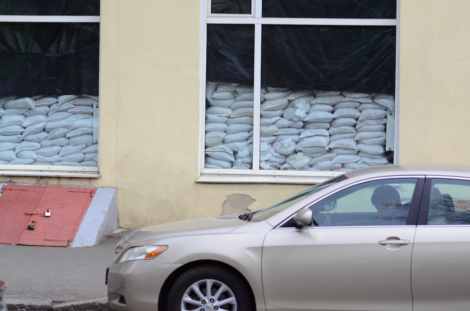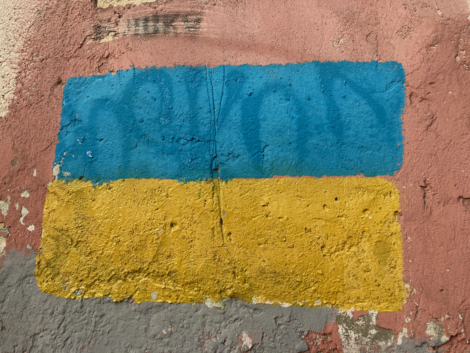News / ’Nothing is sacred’ – 60 days since the Russian invasion of Ukraine began
After having moved to Odesa nine days ago, Shetland journalist Jen Stout witnessed the Ukrainian city becoming the target of a Russian rocket attack this weekend.
EASTER morning – the Orthodox church date is a week after ours this year – and bells were ringing out across Odesa.
They should have been ringing to celebrate the resurrection, but the huge bells of the Holy Transfiguration cathedral, a stone’s throw from where I’m staying, had chimed many times through the small hours, joining the wail of the air-raid sirens. After such an awful day in the city, it was a tense night.
There is some natural, absurd, human inclination to assume that once winter ebbs away, things will get better. The first glimmers of green, that day you turn your face to the sun and soak it up, grateful after such a long winter.
Here, people were largely ignoring the air-raid sirens. There were a few reasons for this: Odesa felt pretty safe since Mikolaiv, 60 miles away, has held out and stopped troops reaching this city; the big cruiser Moskva was sunk on 14 April; Russian forces began concentrating on the east. ‘Everything will be all right’, people say to me, like a mantra.
And yesterday (Saturday), everything felt all right. I’d walked to the long, pleasant Oleksandrivsky Boulevard, down which runs a covered book market. A few shops and cafes have started to open up in recent weeks, and you can get a really nice coffee here.
People were gathering on benches to listen to a free jazz concert given by musicians from a balcony opposite. I nipped into a cafe under the balcony to use their WIFI and do a bit of work. Ten minutes later, there was a huge boom, then another, and another.
Become a supporter of Shetland News
There are very strict rules about sharing rumours or information on the airstrikes. If social media is flooded with details about where a missile has hit, it helps the Russian forces.
Rumours fly anyway, of course – a whole city desperate to know what’s been hit, and where. The trails in the sky indicated something had been shot down – previously these have been reconnaissance drones, but this seemed much bigger. Then the worst news – there’s smoke rising above a block of flats.
The ‘Tiras’ residential block is a bright, stylish modern building, built just ten years ago, in the south of the city. The flats have big windows, some with 180-degree views from a curved section of balconies. Tram lines run right next to the block; you can just step over them.
When I arrived a big crowd had already gathered – some residents that had been evacuated, watching anxiously for neighbours and friends, or to see if the fire threatening their home would be put out.
A man wearing a flat cap, smart shirt, leather jacket and shining brown brogues (Odessan men seem to dress very well) was standing in silence, shaking his head. I asked if he lived here, and he pointed to his flat, told me he’d been out at the time of the rocket strike.
The missiles had hit at about 2.30pm, so luckily some were at work or out in the city. But many weren’t. One woman told me that she had been painting eggs for Easter. Her voice shook – with indignation as much as shock – at this detail. Just normal, happy life going on as it should, the swing of holidays and celebrations, seasons and family.
Another person at home on Saturday afternoon was a new mother, Valeria. Her baby, Kira, was born a month before the war started. “A whole new level of happiness”, she posted, just before Kira was born. Her husband Yuri posted photos of his wife and daughter after they were killed in the missile strike. In one, an adult’s hand carefully holds the tiny baby’s hand as she sleeps. It’s the picture every new parent takes, in wonder at this perfect little person.
Seven rockets in total were fired at Odesa on Saturday. Authorities had warned it could be heavy over Easter; there were rumours of an all-day curfew preventing anyone going to church. But I got the sense people just didn’t believe anything would happen. It’s so barbaric, to target people when they’re marking a holiday.
But that’s the point, isn’t it. If nothing is sacred, if everything is terrifying and full of danger – even a Saturday afternoon at home spent painting Easter eggs – then it becomes very hard to keep going.
Russia claimed responsibility for one of the missile strikes – on a military target in Odesa – but said nothing about the apartment bombing. Two other rockets were shot down over the city by the Ukrainian air defence. But the Russian president doesn’t care how barbaric he looks. In terms of how Ukrainians feel, being barbaric is the aim. He wants them to be paralysed with fear – besieged, bombarded, brutalised. Unfortunately for Putin, they are still defiant, and will remain so.
The other reason he doesn’t care is that his propaganda machine can just churn out some rubbish about ‘fakes’ and Ukrainians ‘bombing themselves’ and a sizeable proportion of the world will lap it up.
People I know are sharing Russian propaganda every day. I don’t think they realise they’re doing it; they think they’re seeking the truth, challenging the mainstream view. It’s incredibly depressing, and infuriates people here, quite understandably.
Today is not only Orthodox Easter, but a grim two-month marker: on 24 February, Russia invaded Ukraine. Thousands and thousands have died since then.
We don’t even know the toll in Mariupol, we don’t know what’s going on in occupied territories. Nothing is sacred; Easter is not sacred, Odesa is not sacred (as some liked to think here), human lives are not sacred – neither Ukrainian lives nor, seemingly, those of the Russian troops and conscripts who have been killed in such huge numbers in that blundering, backwards military machine.
More reporting from Jen Stout can be found here:
Become a supporter of Shetland News
Shetland News is asking its many readers to consider start paying for their dose of the latest local news delivered straight to their PC, tablet or mobile phone.
Journalism comes at a price and because that price is not being paid in today’s rapidly changing media world, most publishers - national and local - struggle financially despite very healthy audience figures.
Most online publishers have started charging for access to their websites, others have chosen a different route. Shetland News currently has over 600 supporters who are all making small voluntary financial contributions. All funds go towards covering our cost and improving the service further.
Your contribution will ensure Shetland News can: -
- Bring you the headlines as they happen;
- Stay editorially independent;
- Give a voice to the community;
- Grow site traffic further;
- Research and publish more in-depth news, including more Shetland Lives features.
If you appreciate what we do and feel strongly about impartial local journalism, then please become a supporter of Shetland News by either making a single payment or monthly subscription.
Support us from as little as £3 per month – it only takes a minute to sign up. Thank you.





























